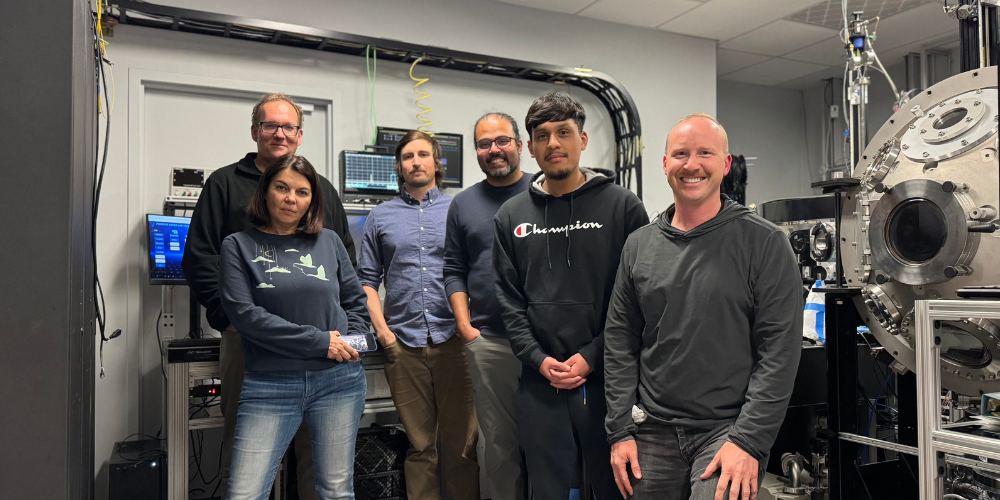Resources
Resources
LaserNetUS Celebrates Success in Pilot Year of Joint Research Initiatives
May 29, 2025. News

Group photo of experimental team members led by Dr. Derek Mariscal from LLNL.
SAN FRANCISCO, CA—LaserNetUS proudly announces the conclusion of a successful pilot year for its Joint Research Initiatives (JRI), a program designed to catalyze multidisciplinary collaboration in high-power laser research. This innovative framework has proven vital in expanding the community and undergirding a network that crosses traditional disciplinary boundaries.
The JRI’s access mode—through which LaserNetUS awards experimental time at select facilities—allows user Principal Investigators (PIs) to collaborate with facility Co-PIs on shared research projects. This dual-PI structure expands the scope of research by enabling the sharing of complementary expertise and resources, which benefits all involved.
A highlight of the program has been the successful implementation of several experiments awarded during LaserNetUS Cycle 6B, which will conclude with the completion of the current research. Dr. Derek Mariscal from Lawrence Livermore National Laboratory (LLNL) conducted one of the standout projects from this cycle at the UCLA Phoenix Laser Laboratory. Titled “Autonomous Physics-guided High-Repetition-Rate Laser-plasma Experiments through the Application of Machine Learning," this experiment demonstrated the powerful integration of advanced computational techniques with high-power laser applications.
The project introduced a machine-learning-assisted experimental guidance framework capable of real-time adjustments during high-repetition-rate (HRR) laser plasma experiments. The research employed optical imaging and Thomson scattering to optimize experimental conditions and achieve specific plasma states autonomously. This was accomplished by varying laser energy, intensity, and background gas pressure. The project's second phase incorporated physical modeling into the control loop, enabling on-the-fly comparisons between experimental outcomes and simulation predictions, thereby enhancing the precision and efficiency of attaining target plasma conditions.
Mariscal, the lead experimentalist and PI for the project at LLNL, emphasized the importance of these collaborations: "Partnering with university and national laboratory teams through the JRI program has driven critical advancements in our work. By merging our expertise in machine learning with the cutting-edge capabilities of UCLA’s Phoenix Laser Laboratory, we have made substantial progress in developing autonomous HRR experiments."
Prof. Christoph Niemann, Facility Point of Contact at LaserNetUS, shared his enthusiasm: “The JRI access mode enables a significantly more impactful and collaborative partnership with the PI. In the months leading up to the experiments, the LLNL team worked closely with UCLA staff and students to implement the required high-throughput computation and EPICS-based device communication infrastructure at Phoenix. These partnerships not only advance individual research endeavors but also enrich the overall laser ecosystem, while enhancing the crucial hands-on training of scientists and engineers.”
As we reflect on this successful pilot year, we remind prospective researchers that although the deadline for Cycle 7 proposals has passed, we will open calls for Cycle 8 proposals this fall. Cycle 8 will run from September 2026 through August 2027, and we encourage new users interested in high-power laser experiments to apply for JRI as their entry point. This upcoming Cycle 8 will strengthen our existing framework, with clearly defined roles for PIs, Co-PIs, and Collaborators, which will facilitate further mentorship and interaction among researchers.
For more details on the JRI program and updates regarding the upcoming Cycle 8 proposal call, please visit https://lasernetus.org/proposal.
About LaserNetUS
LaserNetUS is a collaborative network, supported by DOE Fusion Energy Sciences, dedicated to advancing laser-based research in plasma physics. By uniting various institutions and scientists, we aim to foster innovation and application development that can lead to real-world solutions and a deeper understanding of our universe.
More From News